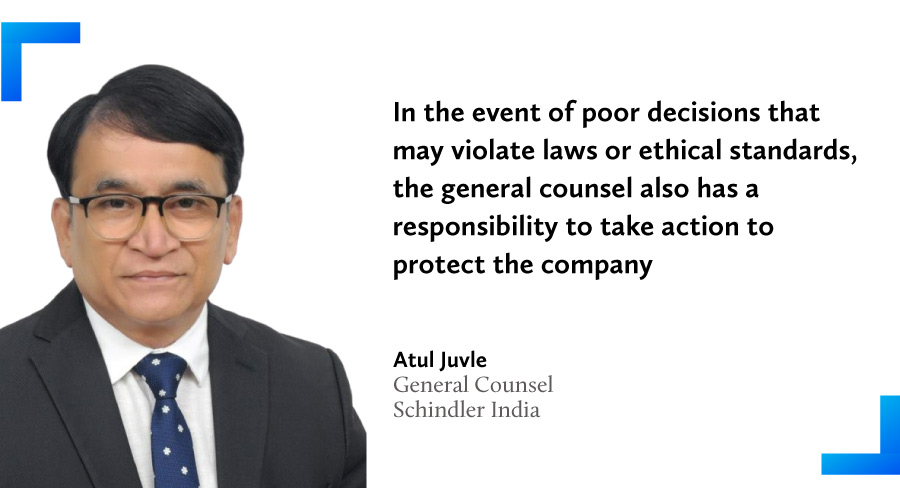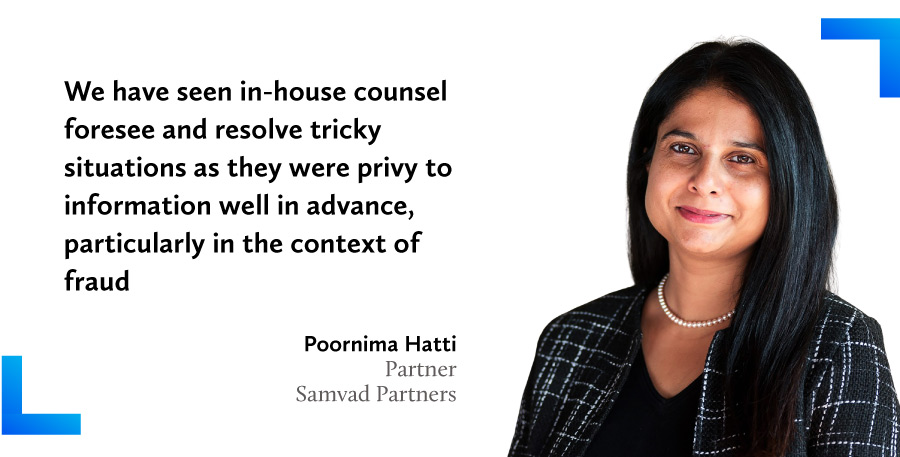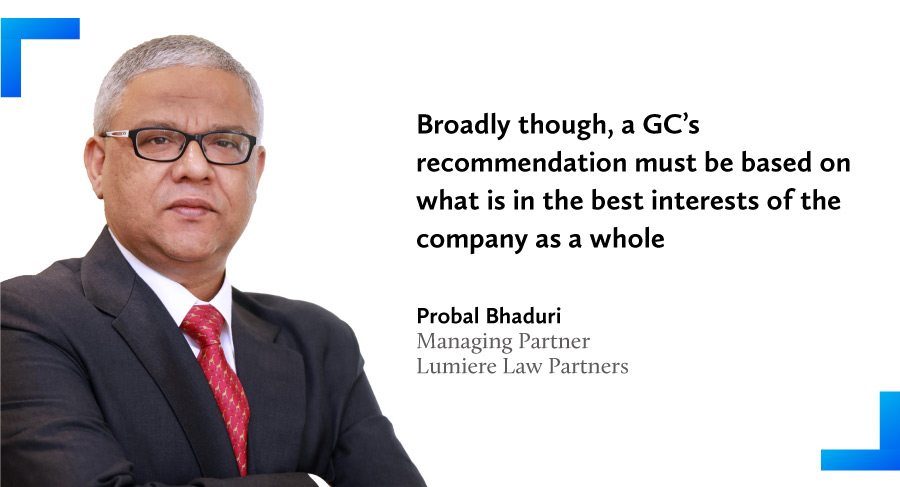As gatekeepers, what can general counsel do when management make poor decisions that cause harm to the business? Indrajit Basu reports.
With growing scrutiny on business owners and founders to conduct business with integrity and transparency, sound decision-making is vital for an organisation’s success, as good decisions can lead to growth and prosperity, while poor ones can lead to losses and even business failure.
While the role of the general counsel (GC) or legal officer in a company remains to provide legal advice and representation to the organisation, in-house legal teams are increasingly becoming strategic business drivers.
The stewardship that the role brings to management has never been more important. This is especially true in the context of poor management decisions, where in-house counsel may be responsible for advising the management team on how to avoid making poor decisions in the first place by providing best practices and legal risk management guidance.
“Traditionally, the primary role of a corporate lawyer [outside counsel] or a GC was compliance. Then their role expanded into transactions,” says Nishith Desai, founder and managing partner of Nishith Desai Associates (NDA) in Mumbai.
“Now, compliances are being completely automated and, in the next five to seven years, with the emergence of blockchain technology, almost 70% of the transactions will be driven by smart contracts. A lot of work will be insourced to legal departments,” he says.
Desai says the role of an in-house counsel is quickly evolving from tick-marking compliance to addressing subjective and critical issues like crisis management strategies and ethical issues.
GCs these days are required to play a major role in protecting the company’s reputation by helping mitigate adverse consequences and developing a plan to address any negative impacts where management is making poor decisions.
Protecting management from itself
“Whenever a management decision, which is not a result of wilful negligence, bad business judgment or fraud, is going awry, the primary responsibility of the general counsel becomes highlighting the risk that is associated as a consequence of that decision,” says Atul Juvle, general counsel, compliance officer and company secretary at Schindler India in Mumbai.
“In the event of poor decisions that may violate laws or ethical standards, the general counsel also has a responsibility to take action to protect the company,” he says, which may involve working with management to communicate with stakeholders and address their concerns, or developing strategies to repair any damage to the company’s reputation.

While the duty of an in-house lawyer continues to be gatekeeping, to ensure that the company is in compliance with relevant laws and regulations “many good senior in-house counsel are conscience keepers as well,” says Poornima Hatti, a partner and co-head of employment practice at Samvad Partners in Bengaluru.
When they become aware of an illegal or unethical activity within the company, they assume the obligation of reporting it and working with management to ensure that there are no allegations made against the company, as well as resolving any concerns.
“We have seen in-house counsel foresee and resolve tricky situations as they were privy to information well in advance, particularly in the context of fraud,” says Hatti. “This privilege ensures that mitigation is easier and the interests of the company are protected well in advance.
“When a GC encounters such a situation, it is critical to weigh the potential consequences of reporting the misconduct against the risks of not reporting it; the GC may want to seek advice from outside counsel or a professional ethics organisation for help with the decision.”
The GC may also suggest alternative ways to increase profits that are legal and ethical, such as expanding the company’s product or service offerings, or improving efficiency. But that, of course, depends on the autonomy of the in-house counsel and how much they can proceed, says Hatti.

Another hurdle in-house counsel face, according to Desai, is lack of regulation. Unlike outside counsel, GCs are not regulated by bodies such as bar councils. When an advocate goes in-house, he gives up his licence to practise as an advocate, as well as his independence, and must “surrender to corporate policies”.
This is why, says Desai, it is time to consider developing a regulatory framework and a code of conduct under the law to provide internal independence to in-house counsel.
The lack of a regulatory regime is also why a GC should be on the board of directors, or be able to communicate with the board about reasons for specific actions and inactions. This is especially true when it comes to decisions with regulatory implications and reputational risk.
The InterGlobe Aviation – parent of IndiGo Airlines – imbroglio is a good example, of how in-house counsel access to the board, and positive advice and actions, ensured an amicable settlement between two warring founders who control more than 77% of the company.
Dealing with resistance
To fulfil their role, GCs, or even outside counsel, must “deftly navigate the complex and often conflicting interests of different stakeholders,” says Probal Bhaduri, managing partner of Lumiere Law Partners in New Delhi.
This may include balancing the needs of the company with the interests of employees, customers, shareholders and even the government.
Dealing with management that is resistant to change is another common problem that GCs encounter. If management is unwilling to listen to a counsel’s advice or take steps to address problems, it can be difficult to make progress and prevent future issues. “Broadly though, a GC’s recommendation must be based on what is in the best interests of the company as a whole,” says Bhaduri.
Still, a GC needs to think like a lawyer and communicate like a business operations head.

Despite the growing importance of their jobs, GCs and outside counsel must also now contend with automation. Legal professionals’ existing and future functions are being challenged by technologies like machine learning, artificial intelligence (AI), and ChatGPT.
“Tools like ChatGPT will soon be able to write judgments [too],” predicts Desai of NDA. ChatGPT, an AI application, is a variant of generative pre-training transformer (GPT), a natural language processing technology developed for generating human-like text.
According to Juvle, of Schindler India, a GC’s job has unquestionably changed from being merely a skilled lawyer to one who adds more value to the company in today’s complex world. Yet ultimately, business is about taking chances, which frequently result in bad decisions, and that’s part of doing business.
“But as long as a GC is promptly flagging those actions and proactively ensuring that full disclosure is furnished for such judgmental errors, I think a GC is doing the job well,” he says.
DISSECTING BAD DECISIONS
TWO LAWYERS SHARE REAL CASES WHERE BAD CALLS WERE MADE BY MANAGEMENT
From Probal Bhaduri, at Lumiere Law Partners:
Case 1: The management of a manufacturing company with public and institutional funding was indulging in the practice of using groundwater in excess of the limit allowed by local environmental permissions.
When discovered, this would not only dent the reputation of the company but would also lead to significant penalties and potential shutting down of the facility.
While the company’s GC flagged this violation, management ignored it on the pretext of “on ground practice”, a practice followed by all other manufacturing units in the vicinity, which the local municipality was aware of.
Besides, any reduction in the water usage would affect production capability, which would be detrimental to the company’s production and profits.
Bhaduri advised the GC to escalate the issue to senior management and the majority shareholders, along with working papers setting out the legal consequences and impact of the violation. The GC should also advise the management on the best course of action.
Case 2: A publicly funded export house supplied commodities that were discovered to be contaminated by the foreign buyer. The buyer demanded a large sum of money in compensation.
Despite the fact that an internal investigation revealed that the contamination was caused by the supplier’s failure to follow proper practices, the GC advised the company’s management, including the majority shareholders, to deny the buyer’s claim and attempt to settle.
The GC was confident that the legal department would be able to prove that the buyer’s claim was false and made with the intention of forcing the company to renegotiate a lower price for the deal under the guise of quality issues.
The GC’s confidence was misplaced, and the company was held liable in the arbitration proceedings and ordered to compensate the buyer. Consequently, the GC’s reputation suffered in the organisation and he was quickly superseded.
Given that the internal investigations revealed a flaw, Bhaduri believes that the GC should have advised management to settle the issue and participate in the settlement proceedings to achieve the best possible outcome.
From Poornima Hatti at Samvad Partners:
Case 1: A multinational office equipment vendor won a large contract from an Indian state government department by sponsoring factory visits to the vendor’s foreign locations. According to the vendor’s GC, because the factory visits had no direct relationship to the contract specifications, the trips were clear violations of the US Foreign Corrupt Practices Act and the UK Bribery Act 2010. Hatti suggested that the GC make an official declaration of this fact to the appropriate government department.
Case 2: A multinational VC firm invested in an Indian company without conducting the required due diligence, which included costly outsourcing. The firm’s GC insisted on completing the due diligence process and resigned when the advice was ignored.


























